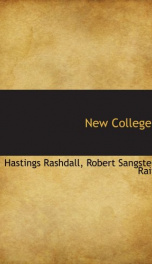Philosophy and Religion

Hastings Rashdall (1858-1924) was an English philosopher who expounded a theory known as ideal utilitarianism. After short tenures at St David's University College and University College, Durham, Rashdall was made a Fellow of New College, Oxford, and dedicates his main work, The Theory of Good and Evil, to the memory of his teachers Thomas Hill Green and Henry Sidgwick. The dedication is appropriate, for the particular version of utilitarianism put forward by Rashdall owes elements to both Green and Sidgwick. Whereas he holds that the concepts of good and value are logically prior to that of right, he gives right a more than instrumental significance. He was president of the Aristotelian Society from 1904 to 1907, a member of the Christian Social Union from its inception in 1890, and was an influential Anglican modernist theologian of the time, being appointed to a canonry in 1909. His other works include The Universities of Europe in the Middle Ages (1895), Philosophy and Religion (1909) and The Idea of Atonement in Christian Theology (1919). --This text refers to the Paperback edition.
Info about the book
Author:
Series:
Unknown
ISBN:
1162782226
Rating:
4/5 (4)Your rating:
0/5
Languge:
English
Users who have this book
Users who want this book
What readers are saying
What do you think? Write your own comment on this book!
write a commentif you like Philosophy and Religion try:
Do you want to exchange books? It’s EASY!
Get registered and find other users who want to give their favourite books to good hands!





